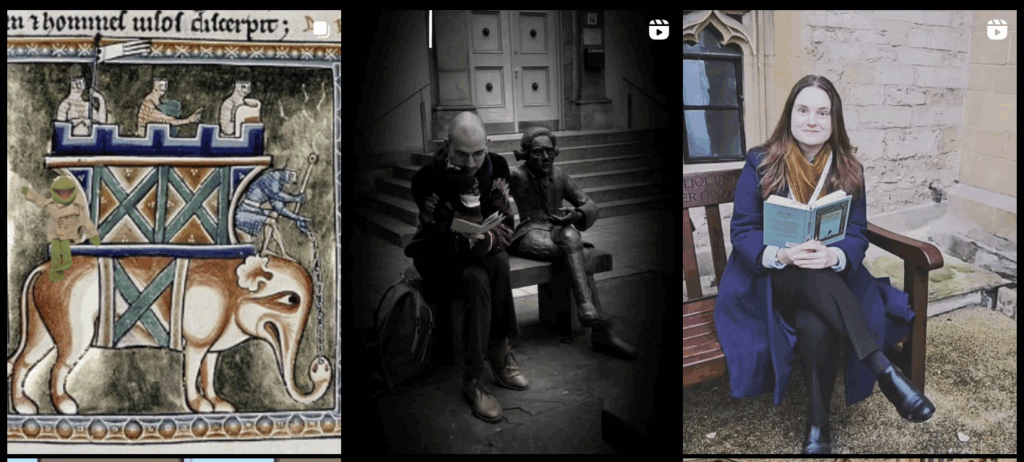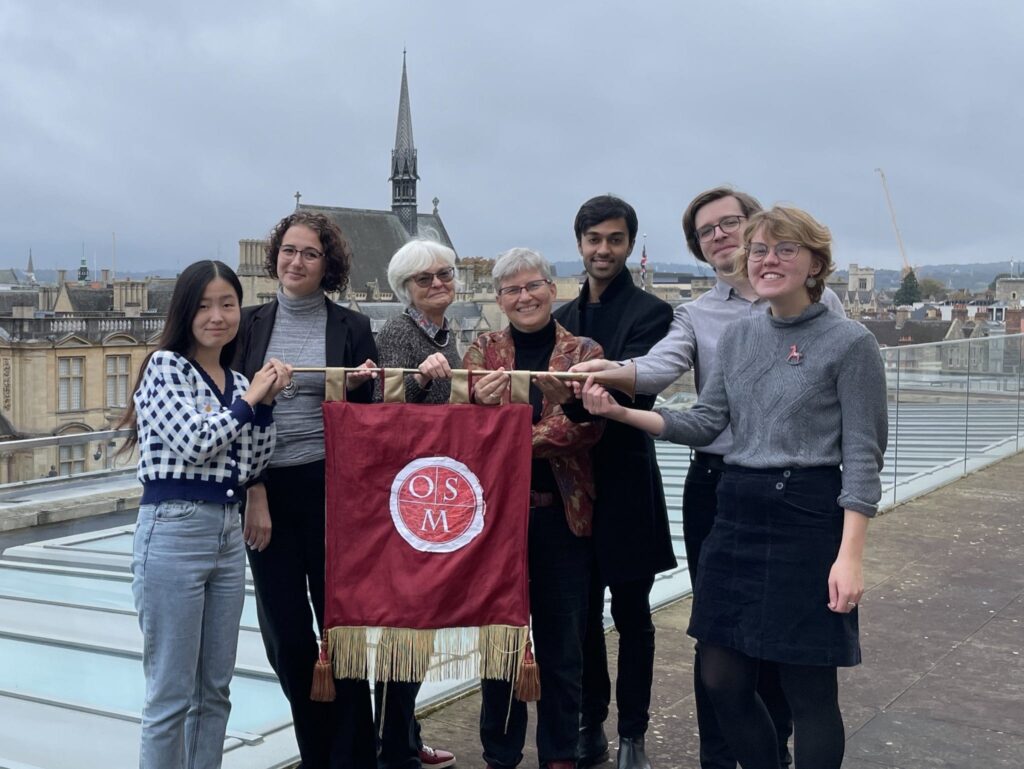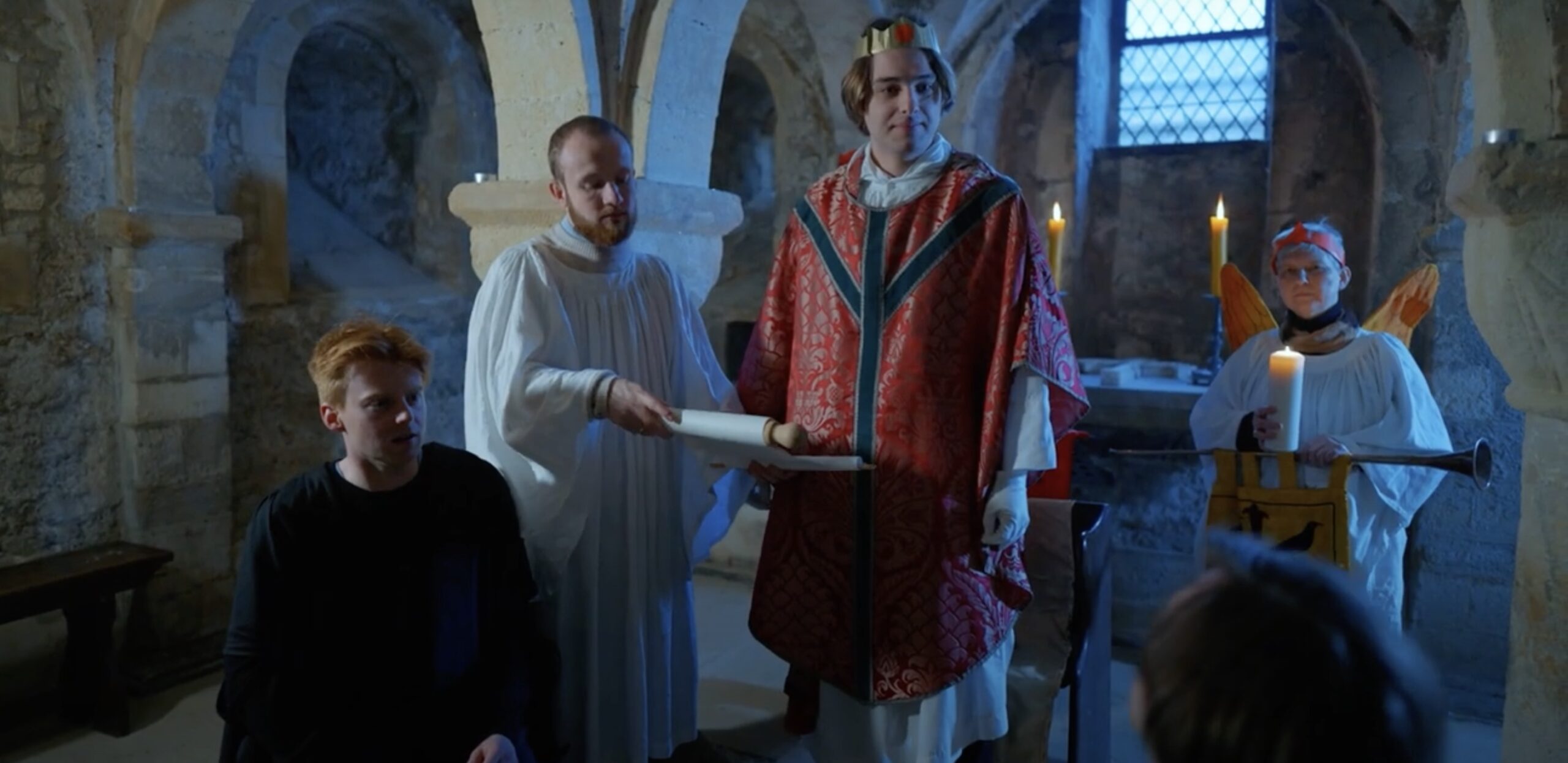Let us begin by toasting the great success that was the Medieval Mystery Plays! I’m sure you will all join me in thanking the great host of people that made the day possible, not least of all the many actors, musicians, directors, and props-people who put on such a spectacle. Particular thanks must go to the organisers – Antonia and Sarah – and, of course, the wonderful Henrike. A full report of the day will be available soon on the OMS blog, so watch this space.
Week One of Trinity term brings a full list of events for you all to enjoy. The full Medieval Studies booklet is available here and always updated on the Oxford Medieval Studies blog – to which you are all invited to contribute! A special call-out to current Oxford Graduate students: please see the opportunities at the end of the booklet for a) the role of Social Media Officer (deadline Friday of week 2 – read the blogpost by our outgoing Social Media Officer Ashley Castelino about what the role entails) and b) for Small Grants (deadline Friday of week 4).
Monday
- French Palaeography Manuscript Reading Group – 10:30 pm in the Weston Library.
- Medieval History Seminar – 5pm at All Souls College. Graeme Ward (Tübingen) will be speaking on ‘Biography, Textual Authority, and the Transformation of the Carolingian World’.
Tuesday
- Medieval English Research Seminar – 12.15 in the English Faculty. Helen Appleton (Oxford) will be speaking on ‘Salvation and the Land in the Old English Andreas’.
- The Latin Palaeography Reading Group meets 2-3.30pm. Please email Laure Miolo for more information.
- Medieval Church and Culture – 5pm in the Wellbeloved Room. This week is the MMC Social – everyone welcome to meet old friends and make new ones.
- Medieval French Research Seminar – 5pm in the Maison française d’Oxford. Tina Montenegro (Boston College) will be speaking on ‘vategories of Knowledge: from Rhetoric to Theology through Brunetto Latini’s Tresor’
Wednesday
- Medieval German Graduate Seminar – 11.15am in Oriel College, Harris Lecture Theatre. The first week will be a shortish planning meeting. The topic for this term are ‘Alexanderroman’. If you are interested to be added to the teams group for updates, please contact Henrike Lähnemann.
- The ‘science of the stars’ in context: an introduction to medieval astronomical and astrological manuscripts and texts – 2pm in the Horton Room (Weston Library). Session 1: Introduction to the relationship between astronomy and astrology from Late Antiquity to the Renaissance.
- Medieval Latin Document Reading Group – 4pm, online, please contact Michael Stansfield.
- Late Antique and Byzantine Seminar – 5pm in the Ioannou Centre.
- Medieval Society and Landscape Seminar Series – 5pm in the Department for Continuing Education. Chris Dyer (University of Leicester) will be speaking on ‘Winchcombe Abbey and 2,000 Peasants: Documenting a Crisis, 1340-1381’. Book here.
- Oxford Centre of Islamic Studies Seminar – 5pm in the Oxford Centre of Islamic Studies. Professor Sevket Pamuk (Bogaziçi University) will be speaking on ‘Political Economy and Economic Institutions of the Ottoman Empire in Comparative Perspective’.
Thursday
- Environmental History Working Group – 12:30 in the Colin Matthew Room, History Faculty. Thomas Laskowski (MPhil Islamic Studies and History) will be speaking on ‘Writing the Environmental History of the Medieval Islamic East’.
- Middle English Reading Group (MERG) – 2pm in the Beckington Room (Lincoln College). Join us to read the ‘double sorwe’ of Troilus and Criseyde in a weekly reading group. We will be reading from the end of Book IV. For more information or to be added to the mailing list, please email rebecca.menmuir@lincoln.ox.ac.uk.
Friday
- Medievalists Coffee Morning – 10.30am at the Weston Library. All welcome, coffee and insight into special collections provided.
- Medieval Manuscripts Support Group – 11:30 in the Horton Room. Readers of medieval manuscripts can pose questions to a mixed group of fellow readers and Bodleian curators in a friendly environment. Come with your own questions, or to see what questions other readers have!
- Exploring Medieval Oxford through Lincoln & Magdalen Archives – 2pm in the EPA Centre (Museum Road) Seminar room 1. Please contact Laure Miolo for more information.
- Anglo-Norman Reading Group – 5pm in the Farmington Institute in Harris Manchester College and online. For more information on the texts, email Jane Bliss.
- Henry Bradshaw Lecture – 5pm in the Collier Room (Regent’s Park College). Helen Gittos will be speaking on ‘Christianity Before Conversion: The Archaeology of Liturgy’
- Medieval Women’s Writing Research Seminar – 5pm in person & online (Lower Lecture Room, Lincoln College). Saudamini Siegrist (NYU graduate) will be speaking on ‘Julian of Norwich and Modern Philosophy’. registration details via their website.
- O’Donnell Lecture – 5pm in Lecture Theatre 2 of the English Faculty. Ronald Hutton (Bristol) will be speaking on ‘The Morrigan Revisited’
- Oxford Medieval Manuscripts Group – 5pm. Merton College Library Visit. Previous experience of handling medieval manuscripts is desirable. Limited places, write to the Oxford Medieval Manuscripts Group email by 30/04/2025
- The Netherhole Martyr – A Dramatic Reading – 6pm at St Edmund Hall. This semi-staged reading of the play by Good Friends for a Lifetime (Maeve Campbell, Minna Jeffery and Lily Levinson) celebrates its recent publication by Strange Region Press. The event is free to attend and no booking is required. The event will begin with drinks at 6pm, followed by a performance in the Crypt that will last until ca. 8pm.
Opportunities
- CfP for ‘Staging Silence from Antiquity to the Renaissance’ – more information here.
- CfP for ‘Music and Reformation: A Symposium at Lambeth Palace Library, 16 September 2025’
- A regular pub trip is being organised on a Friday at 6pm at the Chequers, from 0th week to 8th week, for all medievalists at Oxford. Email maura.mckeon@bfriars.ox.ac.uk










